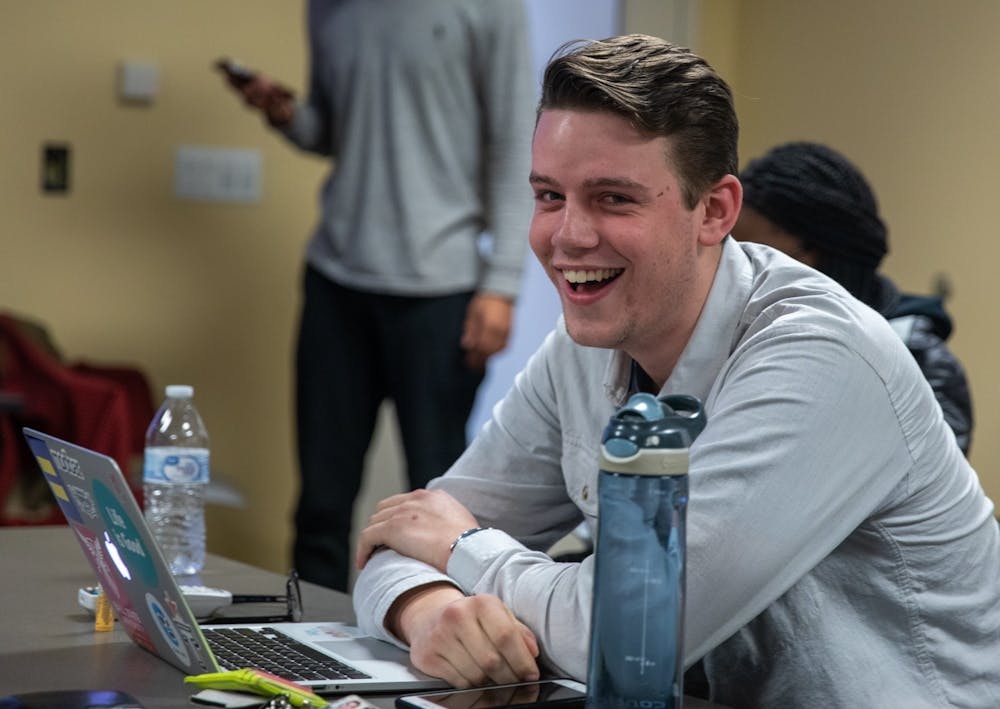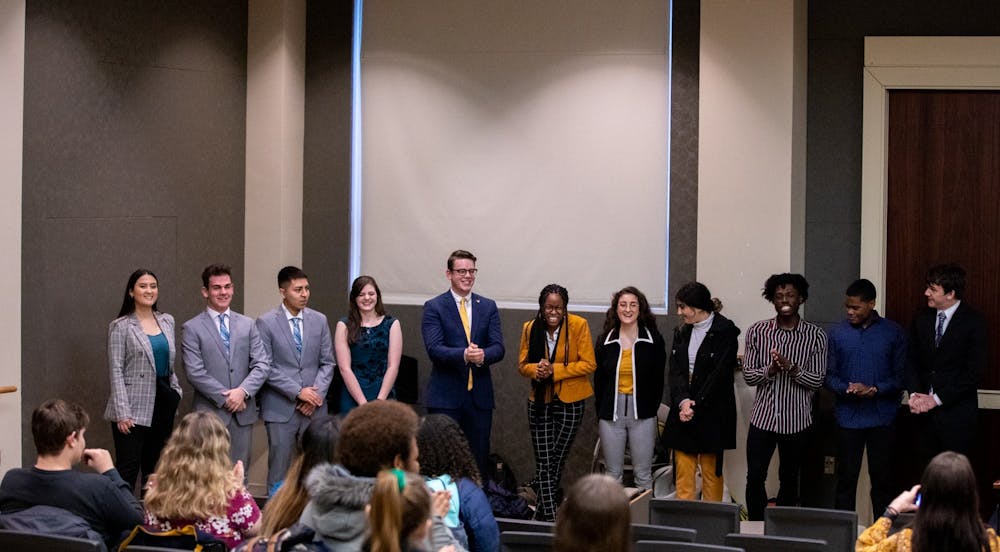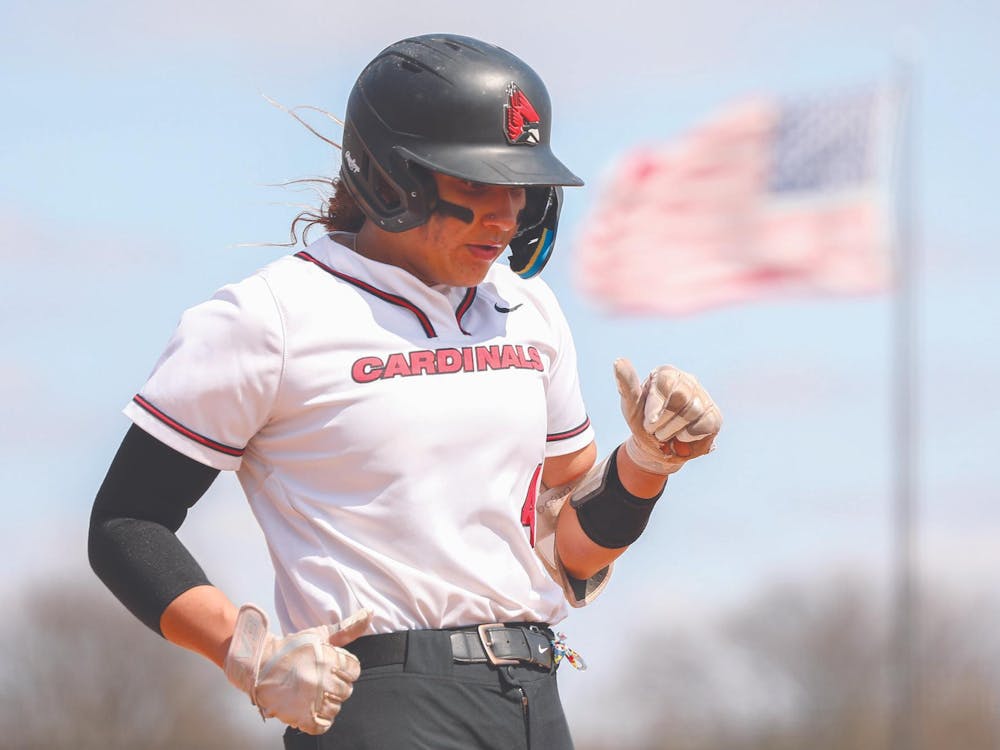Here's a schedule of the Ball State's 2020 SGA runoff election:
-
Feb. 20 — All-Slate Debate
The second All-Slate Debate and fourth debate of this SGA election will be held 7 p.m. at the Art and Journalism Building room 175. -
Feb. 24-25 — Voting for runoff election
Voting for the runoff election will be available online starting 8 a.m. Monday and ending 5 p.m. Tuesday.
For the second year in a row, with no slate gaining 51 percent or more of student votes, two slates — Bold and Alliance — are headed for a runoff election to determine the Student Government Association (SGA) executive slate for the next academic year.
Despite three slates running this year, the approximately 9 percent voter turnout, calculated using total student enrollment from fall 2019, was one of the lowest in a decade for the first round of the SGA election. There were two elections with a lower voter turnout — when two slates ran in 2011 and when one ran in 2018.
Low voter turnout:
Thomas May, SGA’s election commissioner, said one factor that might have caused the low voter turnout was the need for two-factor authentication to cast a vote.
May said there was at least one instance of a student being unable to cast a vote at the on-site polling location because they didn’t have their phone available at the time. Regardless, students could have voted via the link sent to their Ball State email.
Another reason, he said, might be poor attendance during SGA debates — with not more than 50 people in attendance at each of the three debates.
While turnout in recent years has been low, Jim Hague, director of student life and SGA adviser, in an interview prior to the voting, said it was on par with other institutions of similar size to Ball State.
Hague said the low voter turnout is because students are busy and have several competing responsibilities.
“Folks are aware of different opportunities available to them on campus, but if they're not personally connected to [SGA], I think that there's a thought like, ‘Why am I going to vote in something that I don't know, something that I'm not actively involved in presently, even though I might know about it in the periphery?’” Hague said.
May said he’s going to be working with SGA senators soon to amend the elections code and bring institutional changes in to help improve voter turnout.
“Any opportunity that we see to get more voter turnout would absolutely be seen as beneficial and something we want to pursue,” he said.
In order to increase voter turnout for the runoff election, May said, SGA will try to improve engagement with students and spread more information about the upcoming all-slate debate and voting through social media and distributing flyers on campus. He said two emails will be sent out to students on the two voting days reminding them to vote.
Runoff elections:
In 2019, the runoff elections that followed had a lower voter turnout than the first round of voting.
Matt Hinkleman, SGA senator and sheriff of the elections board, said in an email there was interest all around in eliminating runoff elections.
Along with senator Lauren Kamykowski, Hinkleman said he plans on introducing legislation after this SGA election to replace runoff elections with ranked choice voting where students can rank their slates by preference.
“I think the legislation is important because it would significantly simplify the executive slate elections every February,” he said. “A runoff essentially doubles the time SGA spends on its executive elections, which means more stress on the elections board and a lot more stress on the candidates.”
Hinkleman said both the introduction and voting on the legislation should be expected by the end of the spring SGA session.
Reflections on the first round:
While Bold was “pushing to win” in the first round, Connor Sanburn, the slate’s presidential candidate, said the runoff will give the slate “another week to fight.”
“We all want to win without having to go into a runoff election,” Sanburn said. “We have done a good enough effort, a very valiant effort, to get out the vote.”

If an election system that wouldn’t require a majority vote was used, he said, Bold, which secured the most votes of the three slates, would have been “the clear winner.”
Sanburn said he would advocate for a different voting system for future elections. He said a runoff election is “tolling” on students and slate members, and it is difficult to carry the “momentum” from one week to another.
However, he said he’s glad the runoff election will be held before spring break, unlike last year when he was the campaign manager for the Empower slate — allowing him to enjoy the week-long vacation.
The Alliance slate narrowly edged out Aureum by fewer than 60 votes to secure second place in the first round of voting.
“We first need to celebrate because, you know, little accomplishments definitely mean something,” said Aric Fulton, the slate's presidential candidate.

Following the initial excitement of the announcement, Alliance slate members began planning to secure more votes in the runoff, suggesting ideas like reaching out to more residence halls, trying to pick up Aureum’s voters and bringing in more new voters to close the gap.
“I would definitely say participate in student democracy,” Fulton said. “Try to hear out both slates that are currently running, and pick whichever slate you think would best finish [the race].”
Following Aureum’s elimination from the race, Miryam Bevelle, the slate’s presidential candidate, said she was “definitely disappointed” with the result.
“We put a lot of our heart and soul and a lot of our experience into this campaign,” Bevelle said.
Going into future elections, she said she was hopeful to get more students involved because fewer than 2,000 students voting “is kind of shameful.”
While Aureum will not unanimously endorse any slate for the runoff elections, Bevelle said, her slate members could individually endorse anyone of their choosing. Speaking for herself, she said she wouldn’t endorse any slate.
Contact John Lynch with comments at jplynch@bsu.edu or on Twitter @WritesLynch. Contact Charles Melton with comments at cwmelton@bsu.edu or on Twitter @Cmelton144. Contact Rohith Rao with comments at rprao@bsu.edu or on Twitter @RaoReports.





